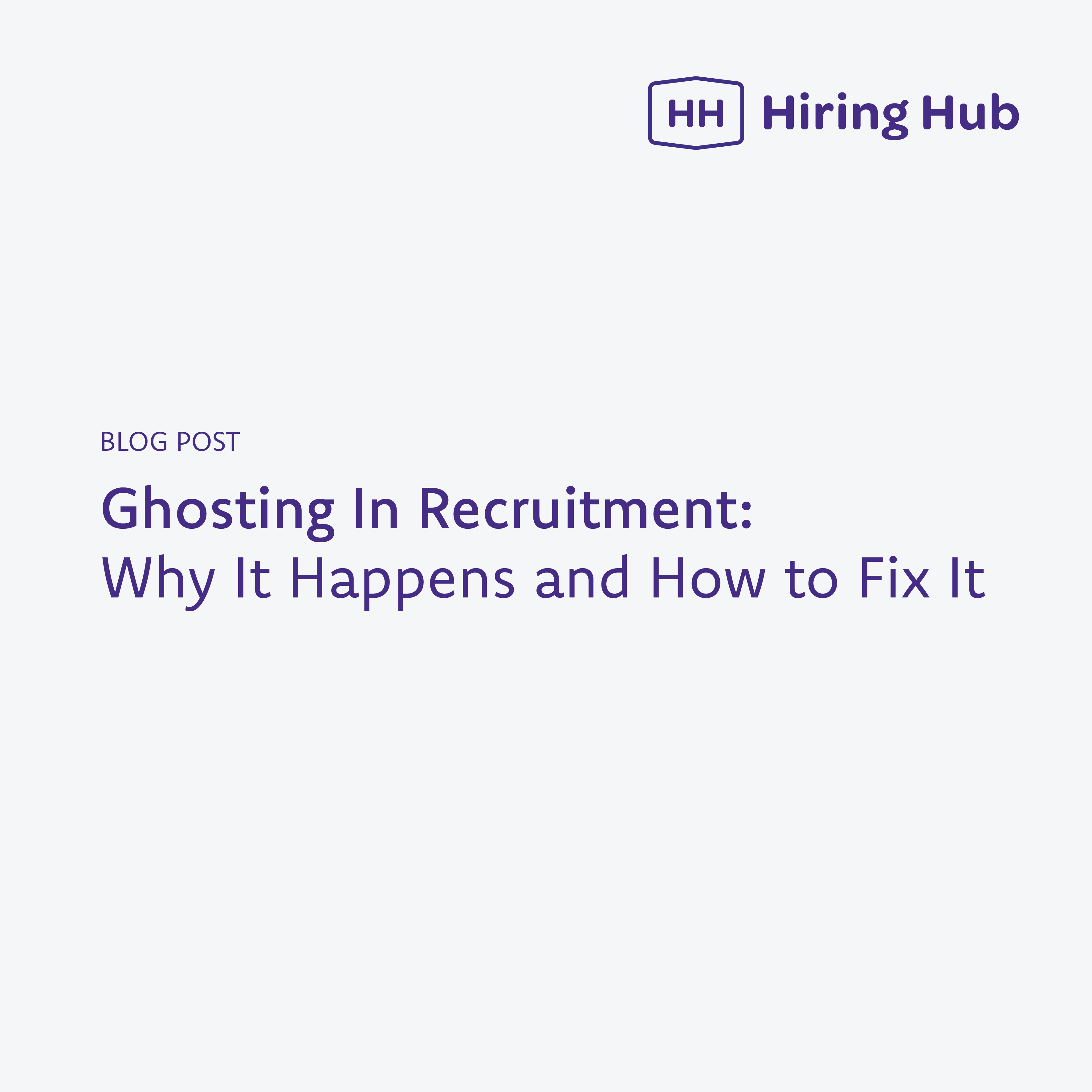Ghosting in Recruitment: Why It Happens and How to Fix It
Every job seeker has likely experienced ghosting at some point in their careers—that feeling of constantly checking your phone or refreshing your...
Businesses of any size need people to drive them towards success. We're not talking about bums on seats, but the real talent that supports an organisation in accomplishing its goals.
Yet, many small business owners can find it difficult to attract workers. The best candidates tend to head for bigger companies with deeper pockets. And the ones who do apply might lack the right skills or don't stick around long enough to make an impact.
Lindsay Mastrogiovanni, CEO of Conscious HR, insists that small business owners must stay invested in their hiring processes:
“Hiring isn’t just about filling seats; it’s about building your future. You'll very often hear me say, ‘Don’t be a victim of the warm body syndrome.’ Most small businesses are hiring reactively, only looking at immediate needs. But without a plan, you risk skill gaps, burnout, and most often, turnover that stifles growth.”
This article explores some of the top hiring pain points for small businesses and how to overcome them. Whether you're dealing with budget constraints, slow hiring processes, or a lack of employer brand recognition, we'll introduce practical steps to attract and retain people who want to take your business to the next level.
Small businesses have an array of recruitment challenges to overcome. Here are some common issues they’re up against every time they have a vacancy to fill:
Money is understandably tighter in small businesses than in larger organisations, making it difficult to compete for top talent. While big companies can afford higher salaries, generous benefits, and attractive perks, smaller employers frequently struggle to match these offerings.
According to Robert Half, 50% of UK small to medium-sized businesses find it difficult to meet their candidates’ salary expectations. This wage gap puts small businesses at a disadvantage, particularly when competing for skilled professionals who may have multiple job offers on the table.
Large organisations have established reputations and substantial budgets to invest in their employer branding. They appear on "best places to work" lists, pay for expensive pitches at career fairs, and benefit from an extensive word-of-mouth network.
As unknown entities, small businesses can struggle to attract any attention. As a result, the Recruitment and Employment Confederation (REC) reports that 81.5% of UK employers with fewer than 50 employees experience a shortage of candidates for their roles.
Many candidates naturally gravitate towards companies they recognise, assuming they offer better salaries, benefits, and career growth. Job applicants also want to list a big brand name on their LinkedIn profile and CV.
For small business owners, recruitment is just one of many responsibilities on an already full plate. With fewer hands on deck, hiring is a slow-moving process, with delays at every stage.
This inertia can have serious consequences. Nearly half of SMB hiring managers report higher turnover rates due to prolonged hiring processes, according to Robert Half’s research.
Skill shortages are also a widespread issue. More than 9 in 10 businesses struggle to fill skill gaps, particularly in entry-level roles. Similarly, Robert Half reports that over 40% of hiring managers say finding candidates with the right skills is one of their biggest challenges for the coming year.
The impact goes beyond just hiring delays. When businesses can’t bring in the right talent, existing employees end up stretched too thin and productivity slows. Some companies resort to hiring underqualified candidates, hoping to train them up, while others put off hiring entirely, leaving critical gaps unfilled. Neither option is sustainable in the long run.
Candidates dropping out mid-process is a common frustration for small businesses. When hiring isn't running smoothly, people start to lose interest. Slow responses, unclear timelines, or too many interview stages can make a job opportunity more hassle than it’s worth.
Many candidates assume silence means the recruiter has ghosted them, so they move on. Others accept offers elsewhere before a small business has even finished making a decision. This can be especially frustrating when the company has already invested time in screening and interviews, only to find themselves back at square one.
Small businesses often struggle to hold onto employees, especially when they can’t offer the same career development opportunities as larger employers. When workers feel there’s little room to grow, they start looking elsewhere, leading to a revolving door of hires and departures.
This is a major challenge across the UK. In 2024, the average employee turnover rate was 35%, meaning more than a third of employees left their jobs within a year.
Of course, some turnover is normal, as employees naturally move on to new opportunities throughout their careers. But when turnover is too high, it disrupts operations, increases hiring costs, and puts pressure on the remaining staff. Equally, when employees see colleagues leaving frequently, team-wide morale takes a hit, and retention becomes even harder.
Small businesses are the underdog of the hiring market. But the following practical strategies can help businesses with limited budgets and resources to attract, hire, and retain top talent.
While small businesses can’t match the salaries offered by larger companies, they can bolster their total compensation package to attract talent. Rather than focusing solely on salary, small businesses should consider adding perks and benefits that make roles more appealing, such as:
Recruiters can support this step by conducting salary benchmarking to help businesses understand where their pay and benefits stand against industry standards.
A strong company culture can turn an organisation into a sought-after workplace. Smaller businesses have something unique to offer—a close-knit team, meaningful work, and a direct impact on business success.
One effective way to showcase company culture is by highlighting your employees and their contributions. Furza, a graduate recruitment and training business based in Manchester, does this well by regularly spotlighting team members on social media. These shoutouts, whether from the company page or individual managers, demonstrate a culture of recognition and support. As example, Ashleigh Cocker, Head of Business Development, recently shared that sales experience isn’t essential for success at Furza. Emphasising a “hire for attitude, train for skill” approach, she celebrated the achievements of her SDR team. This not only highlights team success but also reinforces Furza’s inclusive hiring philosophy, welcoming diverse backgrounds and valuing potential over a perfect CV.
Recruiters can also support small businesses by helping them tell their story, for example, by incorporating important details in job descriptions and careers pages. Showcasing what makes their workplace special sends a clear signal to candidates who can see they align with their values. This publicity encourages them to apply for a role.
Many small business owners juggle recruitment alongside their day-to-day operations, making it difficult to manage multiple recruiter relationships or dedicate time to a well-planned hiring process.
But a lack of structure can result in poor job adverts, unclear role expectations, and disorganised interviews, all of which can delay hiring and contribute to high turnover. Speaking on the Small Business Evolution podcast, host Ashley Beck explains the importance of thorough prep work for every open vacancy:
“If you haven’t given proper consideration to the requirements of the job you’re looking to fill, creating a standout job advert, and thoroughly planning your interview, hiring, and onboarding processes, then all you’re going to do is waste a whole lot of time and money promoting the job in the wrong way. You’ll get the wrong type of applicants for the role, which will delay hiring, meaning delaying relief for yourself and your staff who are currently covering the work that you need the new hire to do.”
Bringing in specialist recruiters can streamline the process for small businesses, ensuring better organisation and faster decision-making without compromising on quality. A structured approach also keeps candidates engaged and informed so you lose fewer to speedier competitors.
If your past recruitment strategy has been to fixate on finding candidates with the right level of experience, you may have waited months for the perfect candidate to appear. Instead, skills-based hiring prioritises a candidate’s abilities over traditional qualifications or years in a similar role. This makes it easier to find capable people, even if their background isn’t a perfect match on paper.
This skills-first approach is gaining traction. TestGorilla reports that 84% of UK companies have adopted skills-based hiring to improve retention and job performance. The shift away from degree requirements and rigid experience thresholds has allowed businesses to widen their talent pool while ensuring new hires can actually do the job.
For small businesses, the first step is to identify the essential skills missing in their team. Instead of relying on job titles as a hiring filter, recruiters should:
A skills-first mindset reduces mis-hires and improves retention. Employees selected for their competencies tend to be more engaged and productive, leading to a stronger, more adaptable workforce.
A poor candidate experience can cause businesses to lose great talent before the hiring process is even complete. Candidates want clarity, responsiveness, and a smooth process. When they don’t get it, they often drop out in favour of companies that communicate better.
Recruiters for small businesses can improve candidate engagement by focusing on:
Career development is one of the biggest factors influencing employee retention. While small businesses may not have the rigid career ladders of larger organisations, they can create growth opportunities through skill-building and internal progression. Employees who see a future within a company are far more likely to stay. In fact, LinkedIn's Workplace Learning report suggests that offering development opportunities is the top strategy for 88% of organisations concerned about employee retention.
However, many other businesses are cutting back on development. A 2025 survey by the British Chambers of Commerce found that nearly one in five businesses has reduced investment in staff training due to economic pressures.
Small businesses can boost retention by focusing on the following professional development incentives which recruiters can promote during hiring processes:
Hiring challenges shouldn’t hold small businesses back. With a structured, efficient recruitment process, employers have a better chance of securing the right talent, without the endless cycle of turnover and delays.
A recruitment management platform like Hiring Hub connects businesses with multiple specialist recruiters. Employers can fill roles faster, improve candidate engagement, and expand their reach without the burden of extra admin.
At Hiring Hub, we make recruitment structured, transparent, and hassle-free. Our platform streamlines hiring from start to finish, giving you faster access to top candidates and smoother communication with recruiters.
Take a free employer trial today and see how Hiring Hub can transform your recruitment process.

Every job seeker has likely experienced ghosting at some point in their careers—that feeling of constantly checking your phone or refreshing your...

Congratulations! You’ve gone through the hiring process and found yourself a brilliant candidate. Not only someone who can do the job, but someone...

Quiet quitting and quiet firing have dominated HR news headlines in recent years. But now there’s another buzzword to get to grips with — quiet...